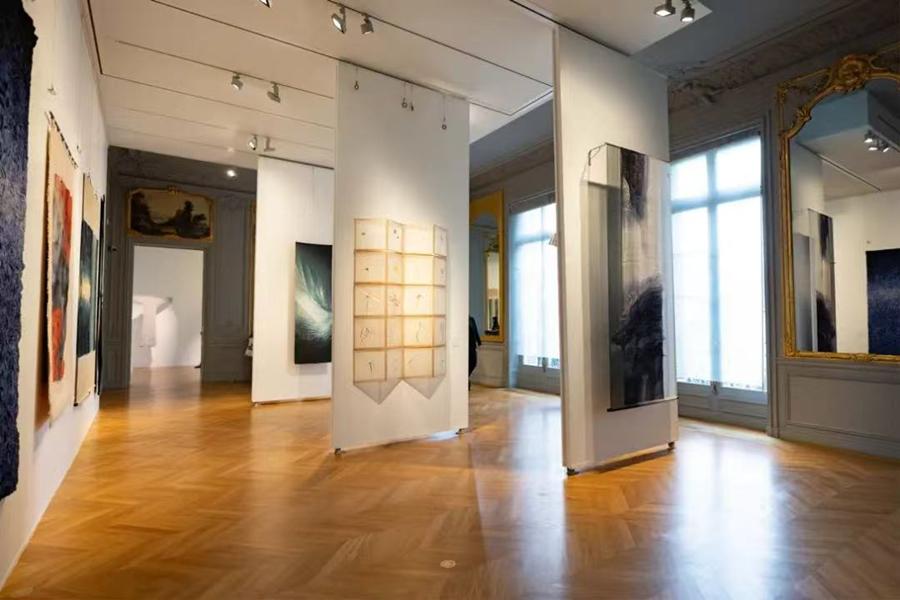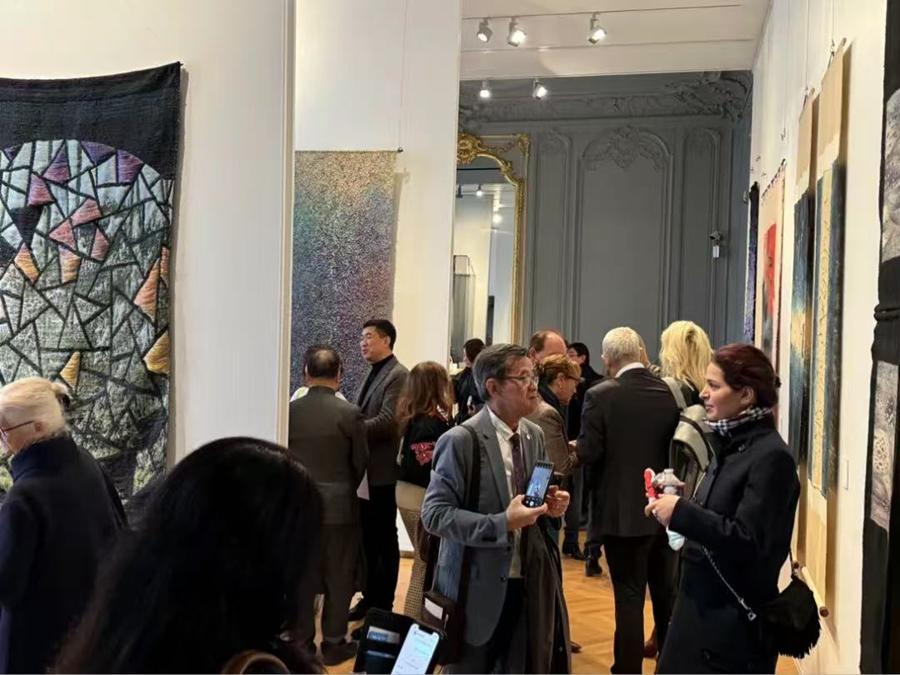China.org.cn , November 21, 2024
Spotlight on contemporary Chinese textile art
Chinese textile art pieces on display at the "Creation of Brilliant Chapters" exhibition at the China Cultural Center in Paris, Oct. 7, 2024. [Photo courtesy of AADTHU]
On Oct. 7, another event opened at the China Cultural Center in Paris to boost the vibrant cultural exchanges between China and France to new heights. The "Creation of Brilliant Chapters: Exhibition on Contemporary Chinese Textile Art and Sino-French Textile Arts Forum," a significant event jointly hosted by AADTHU and the center, was organized by AADTHU's Department of Arts and Crafts in collaboration with the Special Committee on Textile Art and Design of the China National Arts and Crafts Society. Over 120 guests from both nations attended the opening ceremony.
AADTHU dean Ma Sai noted that since the 1980s, textile art in China has developed into an independent modern art form that draws from the rich traditions of Chinese culture, achieving notable international recognition. He emphasized the influence of the From Lausanne to Beijing: International Fiber Art Biennale , initiated by AADTHU in 2000, which has become a globally significant platform for textile art. At the same time, over the past 15 years, the contemporary Chinese textile art exhibition launched by the academy has reached nearly 20 countries, including the United States, Belarus, Ukraine, Poland, Mexico, Australia, Georgia, Italy and Spain, playing an important role in promoting Chinese culture worldwide and facilitating international cultural exchanges.
Yang Dongjiang, vice dean of the academy, remarked on the exhibition's role as a new chapter in cross-cultural dialogue between Chinese and French artists. He said, "This exhibition not only serves as a feast for the arts but also embodies the beautiful vision for deepening cooperation and exchange in the cultural and artistic realms between our two nations."
Rémy Aron, president of the French Association of Arts, noted that over the past 20 years, he has visited China multiple times, and praised AADTHU as one of the world's finest schools of arts and crafts. This year, in connection with the 2024 Paris Olympics, the French Association of Arts also signed a cooperation agreement with Tsinghua University. He expressed his hope that Sino-French friendship will achieve new brilliance in artistic creation and other fields in the future, contributing to the development of human civilization, harmony and peace in the world.
Curator Yue Song highlighted the rapid development of textile art in China over the past four decades. He mentioned the exhibition's inclusion of works from 26 Chinese textile artists from 18 art institutions, showcasing their unique understanding of materials, techniques and forms. "I hope to see more Chinese textile artists exhibit their works in Paris in the future, contributing together to the development of the art," Yue added.
The exhibition, which ran until Oct. 19, reflected the long history of cultural exchanges between China and France, dating back to the 14th century when Chinese silk captivated European nobility. By the 18th century, France embraced "chinoiserie," blending Eastern motifs with Western design. This historical context enhanced the significance of contemporary exchanges highlighted in the exhibition.
Visitors attend the "Creation of Brilliant Chapters" exhibition at the China Cultural Center in Paris, Oct. 7, 2024. [Photo courtesy of AADTHU]
Liu Hongge, director of the China Cultural Center in Paris, emphasized the unique role of textile art in Sino-French cultural exchanges, recalling the impact of Jean Lurcat, a prominent French tapestry artist whose works influenced Chinese textile artists in the 20th century. He stated, "Every textile of textile art symbolizes life's essence, weaving stories of knowledge, integration and friendship between China and France."
"The exhibited textile art pieces are not only a visual feast but also a medium for emotional expression and intellectual exchange. Behind these works are many touching stories that convey the unique feelings, rich reflections and boundless creativity that Chinese textile artists aim to express," he added.
A forum on Sino-French textile art commenced later that day with speeches from prominent scholars, experts and artists, including Ni Yuehong and Pascal-François Bertrand. Discussions focused on the intertwining of historical and contemporary textile art with social, economic and aesthetic factors, as well as teaching methods and the cultural significance of these exchanges. The event attracted a diverse audience, sparking lively discussions that continued beyond the formal sessions. For many attendees, it was not just an exhibition but a gateway to a deeper understanding of the intersections between Chinese and French textile art. Participants expressed enthusiasm for the collaborative spirit and the potential for future exchanges.


